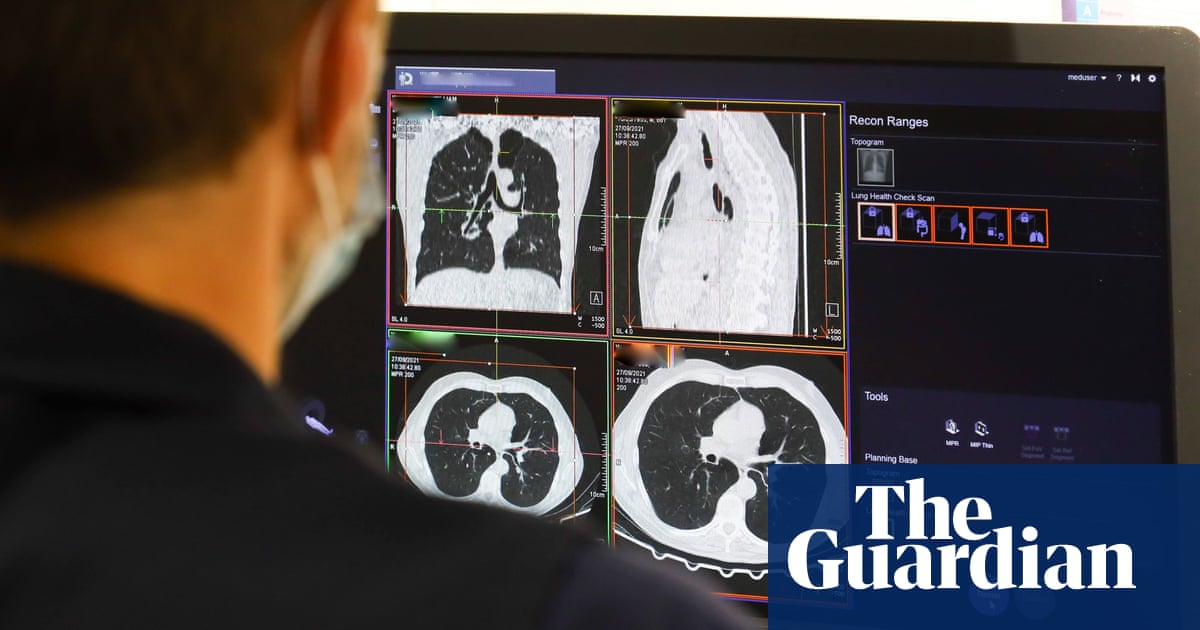Doctors are hailing “amazing” trial results that show a new drug combination stopped lung cancer advancing for more than 40% longer than the standard treatment.
Lung cancer is the world’s leading cause of cancer death, accounting for about 1.8 million deaths every year. Survival rates in those with advanced forms of the disease, where tumours have spread, are particularly poor.
Patients diagnosed with advanced forms of lung cancer who took the combination of amivantamab and lazertinib were still alive with no progression in their disease after 23.7 months on average, according to data from the global study. Average progression-free survival in patients using the standard drug, osimertinib, was 16.6 months, the trial found.
Experts said the breakthrough came amid a “golden age” of cancer research where a greater understanding of what spurs on specific tumours is informing better ways to beat the disease.
Prof Martin Forster, a medical oncologist at University College hospital and the trial’s chief investigator in the UK, said: “Better understanding of the biology that drives lung cancers has guided the development of these targeted therapies.
“It’s amazing to see this new combination shows longer cancer control than osimertinib, which was itself a breakthrough treatment only a few years ago.”
In the phase 3 trial, 1,074 patients were recruited between 2020 and 2022 from countries including the UK, US, Australia, France, Brazil, India and China. Each had an advanced form of non-small cell lung cancer (NSCLC), the most common form of the disease.
In the UK arm of the trial, patients were recruited from University College London NHS trust, the Christie in Manchester, Chelsea and Westminster hospital in London, Nottingham university hospitals NHS trust, the Royal Marsden NHS trust, and the Edinburgh Cancer Centre at Western general hospital.
Everyone in the trial also had a mutation of the epidermal growth factor receptor (EGFR) gene, found in as many as a quarter of global lung cancer cases, and about 40% of cases in Asia.
An EGFR mutation is more common in women than men, and in people who have never smoked or have been light smokers.
Patients in the trial were randomly assigned to receive either the drug combination of amivantamab and lazertinib; the standard treatment for this group of patients, osimertinib; or lazertinib.
Amivantamab is a monoclonal antibody while Lazertinib is a tyrosine kinase inhibitor. Both drugs target cancer cells to halt their advance.
Prof Raffaele Califano, a consultant in medical oncology and the trial’s principal investigator at the Christie, said: “By combining these two drugs, which stop the cancer from growing in different ways, we see a significant improvement in progression-free survival rates compared to the drug we currently use.
“Survival rates for lung cancer are still very low compared with other types of the disease and so to see such positive results is a welcome development.”
In August, the drug combination was approved by the Food and Drug Administration in the US. Doctors involved in the trial hope the treatment might also be available on the NHS in future.
“The more treatment options we have, the more hope we bring to patients and families,” said Califano. “We are hopeful that this option will be endorsed by Nice [the National Institute for Health and Care Excellence] and reimbursed for use in the NHS.”
Most of the patients experienced some side-effects. The most common types reported in the trial, which was funded by Janssen, were a rash, an infection or a blood clot.
Doctors involved with the trial said the drug combination formed part of an emerging area of treatment called precision medicine.
Advances in precision medicine have led to new treatments tailored to specific characteristics of individuals, such as a person’s genetic makeup, or the genetic profile of a patient’s tumour.
Forster said: “This precision approach is improving outcomes for many more of our patients, as new drugs are being developed to exploit vulnerabilities being identified in increasing numbers of lung cancers.”
Paula Chadwick, the chief executive of the Roy Castle Lung Cancer Foundation, said: “Hope is rocket fuel for people with lung cancer. Each new breakthrough keeps that hope burning, even if it doesn’t directly benefit an individual.
“While this potential new treatment would only be available to a select group of people within the lung cancer community, it demonstrates the ongoing progress in our fight against the disease, improving treatment options, transforming care and, ultimately, helping people live well with lung cancer for longer.”
Anna Kinsella, a research information manager at Cancer Research UK, described the results as “good news”, with those on the drug combination “able to have more time with their loved ones”.
“We are in a golden age of cancer research where a greater understanding of what drives specific cancers is informing new and better ways to beat the disease,” Kinsella added. “Research like this helps more people to live longer, better lives, free from the fear of cancer.”













